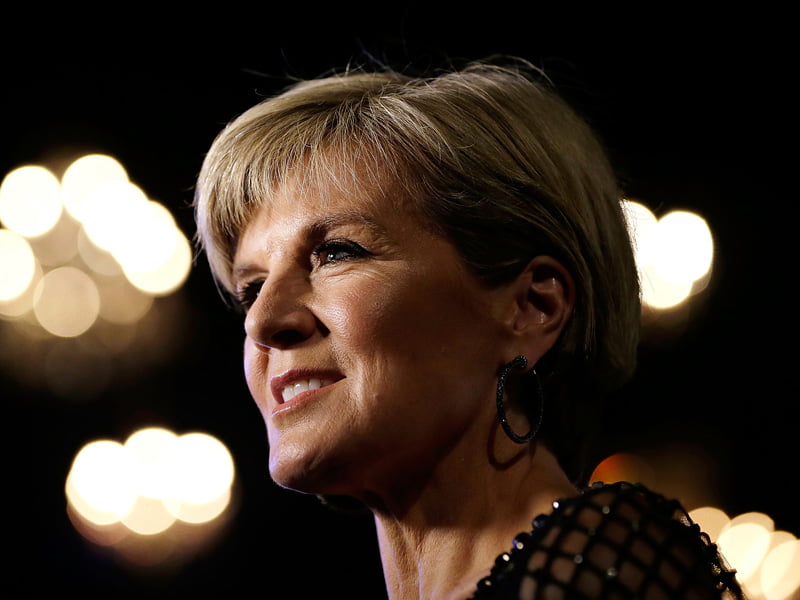The federal government has launched Australia’s first international cyber strategy, with a focus on growing digital trade, improving cyber security in the Indo-Pacific and countering state-based cyberattacks.
The International Cyber Engagement Strategy outlines the cyber affairs agenda over the next three years and was launched by Foreign Affairs Minister Julie Bishop in Sydney on Wednesday.
“The strategy sets out our plan to mitigate the risks and harness the opportunities across the full spectrum of cyber affairs. The borderless nature of cyberspace presents us with as many challenges as it does opportunities,” Ms Bishop said in the speech.

“For the internet to remain an accelerator of economic prosperity and sustainable development, we must engage internationally with governments, private sector and civil society to advance our shared interests.”
“While nations are using cyberspace to drive economic growth and to improve the delivery of services, many are also exploring the use of technology for defensive and offensive applications,” she said.
“This makes the management of cyber issues a matter of international strategic importance.”
The strategy is a core component of the government’s $230 million Cyber Security Strategy launched last year.
The Cyber Cooperation Program, which also launched last year with $4 million in funding across four years, will receive an additional $10 million over three years to fund many of the initiatives in the new strategy.
The strategy outlines Australia’s cyber affairs agenda, which it says is “global in perspective and regional in focus”.
“Our international cyber engagement protects Australians and promotes our interests. It positions us to harness opportunities and increase our cyber resilience. An open, free and secure internet drives economic growth, enhances our national security and fosters international stability,” the strategy reads.
The strategy establishes a whole-of-government approach to seven themes:
- Digital trade
- Cyber security
- Cyber crime
- International security
- Internet governance and cooperation
- Human rights and democracy online
- Technology for development
The government will establish a quarterly whole-of-government meeting to coordinate and prioritise Australia’s international cyber activities, along with an industry advisory group to meet biannually, and a Cyber Affairs Curriculum for the nation’s international representatives.
The strategy puts focus on the actions of nation states in cyber space, with Ms Bishop pointing directly to Russia’s involvement in last year’s US presidential election.
“Boundaries are being tested. The 2016 US presidential election focused the world’s attention on the potential for cyber operations to interfere with democratic processes,” Ms Bishop said.
“This cannot be allowed to continue, it strikes at the very heart of the sovereignty of nations and Australia will guard against attempts to use such measures to interfere with Australian domestic affairs or seek to undermine our institutions.”
The strategy outlines how the government plans to work with other nations to counter state-based cyberattacks, and to deploy offensive cyber capabilities if necessary.
It states that responses to malicious cyber activity could include law enforcement or diplomatic, economic or military measures.
“This could include….offensive cyber capabilities that disrupt, deny or degrade the computers or computer networks of adversaries,” the strategy says.
“Reaffirming the application of international law to cyberspace, adhering to norms of responsible behaviour in cyberspace and implementing confidence-building measures will shape cyberspace as a landscape for international cooperation and mutual benefit.”
The government will also regularly publish Australia’s “position on the application of relevant international law to state conduct in cyberspace”.
The international cyber strategy also outlined how the government will “maximise the opportunity for economic growth and prosperity through digital trade”.
This includes further efforts to establish commitments on digital trade with nations including Indonesia and Hong Kong, and through the negotiations for Regional Comprehensive Economic Partnership and the Trade in Services Agreement.
Other strategies include efforts to coordinate standards internationally and the establishment of a Secure Trade Lane with New Zealand.
“Australia is committed to actively shaping global rule-making on digital trade. Australia will advocate for global rules that support digitisation of trade-related practices, build trust and confidence in the online environment and reduce barriers to digital trade,” the strategy reads.
The government will be looking to “strengthen and expand” information sharing with partners and trusted networks in relation to cyber security, and will look to develop international standards to encourage the coordination of standards for digital products.
The strategy places a key focus on the Indo-Pacific region, and on improving cyber security and technological capability in the area.
The government will establish a Pacific Cyber Security Operational Network, to involve technical experts from governments in the Pacific, academia and not-for-profits to establish operation cyber security points of contact and empower members to share threat information.
The government will also aim to increase cybercrime awareness in the Indo-Pacific, and assist other nations with drawing up legislation and preventing regions from becoming “cybercrime safe havens”.
“Cybercriminals operate globally, so Australia will respond in kind. We will deepen bilateral, regional and global partnerships to increase cooperation and build our collective capacity to combat this threat,” the strategy says.
“Cybercrime is a shared challenge and Australia encourages other countries to take an active role in initiatives that address this international issue.
Government will encourage private industry to work on initiatives to improve digital connectivity in the region, and partner with regional organisations and governments to improve internet accessibility.
“The Indo-Pacific is also home to some of the world’s least connected countries, where Internet penetration still sits in single digits and digital opportunities are yet to be fully harnessed,” it says.
“Digitally enabled development must take into account inter-regional differences in connectivity and digital readiness.”
The strategy details how many of these initiatives will have a focus on maintaining human rights and privacy in cyberspace.
Do you know more? Contact James Riley via Email.

